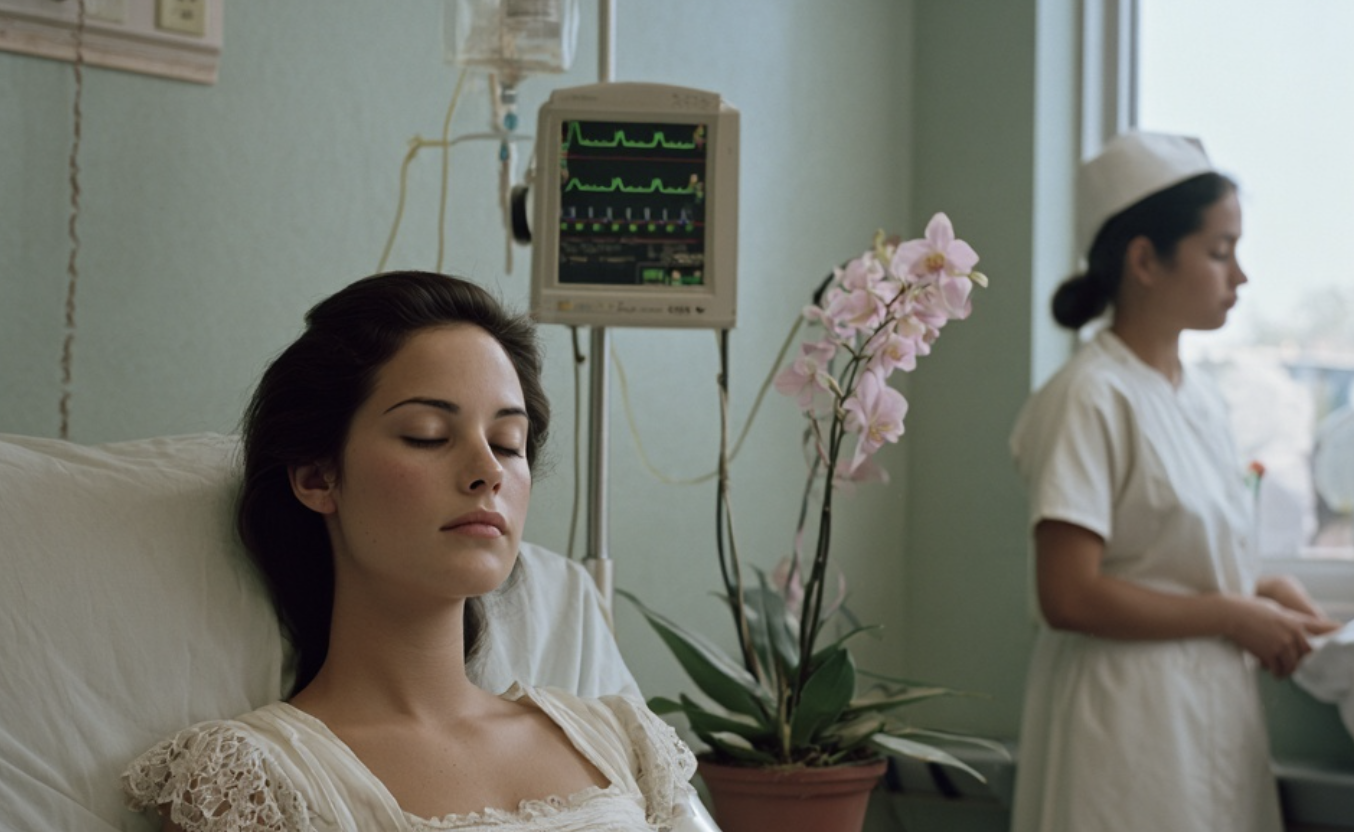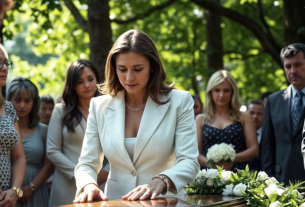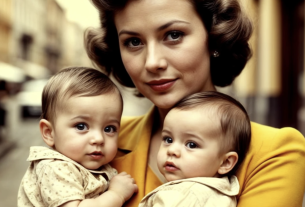In the doctors’ break room hung the cloying, bittersweet smell of burnt coffee and frayed nerves. The air was thick as jelly, saturated with night shifts, anxious monitor beeps, and quiet despair. Nina Petrovna—a woman built like a solid samovar, with a face where sternness had long since taken up permanent residence—slowly stirred the third spoonful of sugar into her enormous mug, the spoon clinking faintly. Her fingers, used to the precision of syringes and IV lines, moved automatically.
“Ten years in this surgical ward and I thought I’d seen it all,” she said to the room at large, not looking at the young nursing aide, Svetlana. “But for the lead surgeon to be coming to work with a child… No, that’s a first.”
Svetlana, whose eyes had not yet lost the sparkle bestowed by nursing school and whose heart was not yet armored in cynicism, sighed sympathetically. Her own white coat felt strange on her—too white, too roomy.
“Where else is he supposed to go, Nina Petrovna? Lydia…,” Sveta faltered, searching for delicate words, “…packed her bags and left. They say for that business partner of his. And little Dasha is left alone. Lev Grigorievich is tearing himself in two between the OR and his daughter.”
“Tearing himself in two,” the head nurse snorted, though there wasn’t a drop of spite in her voice—only tired, hard-earned wisdom and a bitter understanding. “A God-given talent. Golden hands. Saves the ones everyone else has given up on. But in life… well, in life it’s like this. Third week here with his daughter. Good thing the girl’s quiet as a mouse. Sits in a corner and draws.”
Both women fell silent, staring into the murky surfaces of their cups. They were thinking about the same person—surgeon Lev Grigorievich. His name echoed through the hospital halls, collecting legends, especially after he, like a knight without fear or reproach, took on that almost hopeless case—the patient in Room Seven.
“And the millionaire—how is she? Still the same?” Svetlana whispered, instinctively lowering her voice, as if afraid to disturb the fragile balance between life and death.
“The same. Critical but stable. Ariadna… what a beautiful name. A queen’s name. And they say she herself is a woman in the pink of health—strength and grace. After that attack… our luminaries just threw up their hands, and Lev Grigorievich sank his teeth in. Pulled her back. Wrenched her from the other side. Now he won’t leave her—stands guard like a dog at his master’s bed. He still hopes she’ll wake up.”
Svetlana peeked timidly into the long corridor, deserted at that pre-dawn hour. In a small improvised kids’ corner, set up by kind hospital hands right by the nurses’ station, a little girl sat. Two dark, tightly braided pigtails stuck out in different directions. Brow furrowed, with a focus not at all childlike, she drew something in bright markers in her sketchbook, entirely ignoring the hospital bustle, the squeak of gurneys, and the muffled groans.
“Dasha is an angel in the flesh. Such a smart little thing, bothers no one. Just looking at her makes your heart tie itself in knots.”
“And this Ariadna’s husband?” Nina Petrovna changed the subject; a faint, almost imperceptible note of suspicion crept into her voice. “Artur. He comes, sits ten minutes with a stone face as if at a boring meeting, and leaves. They say he’s ten years younger than she is. That’s all we know. Odd bird. Cold.”
Just then the door to the break room creaked open, and in the doorway appeared a tall, slightly stooped figure in a white coat that had once been perfectly pressed and was now rumpled. It was Lev Grigorievich. A shadow of heavy stubble darkened his sunken cheeks, but his eyes, hollowed by sleeplessness, burned with a strange, piercing fire.
“Nina Petrovna. Sveta,” his voice, usually velvety and assured, was hoarse with exhaustion, yet steel rang in it. “Be ready. I think our patient in Room Seven… there’s a shift. Positive dynamics. I saw her eyelids move.”
He didn’t wait for an answer, turned, and left. His footsteps quickly faded down the corridor. The nurses exchanged glances. The air smelled of a coming storm. Of hope.
The children’s nook, tucked into a cozy alcove, was a kind of observation post. From there you could see almost the entire corridor, while the alcove itself went largely unnoticed. Dasha had just finished a purple dress for the princess and was starting on the knight when a man sank heavily onto the visitors’ bench opposite. She had seen him before. He was the very uncle who came to the sleeping lady. He pulled out his phone, and his handsome, smooth face twisted into a sudden grimace of malice.
“How much longer?” he hissed into the receiver, his whisper snake-like. “I’m not paying for that snot-nosed sawbones to run experiments on her! She was supposed to… Just do something! I don’t intend to wait forever!”
Dasha flinched and recoiled as if from an unexpected blow. She didn’t understand all the words, but the icy, poisonous hatred in his voice was palpable. And she knew perfectly well—this mean uncle was talking about her papa. Her papa who hadn’t slept nights to save that lady. A hot, unpleasant lump seized her throat—she felt insulted and scared all at once. The man stood abruptly and strode away, quick, irritated steps disappearing around the corner.
Later, when the nurses scattered on calls, Dasha crept on tiptoe, hugging her sketchbook to her chest, to the slightly open door of Room Seven. She desperately wanted to see the very lady whose sake that mean uncle was saying such awful things about her papa. The woman in the bed was as pale as the sheets, wrapped in wires and tubes, like a doll who’d been played with cruelly. But to Dasha she simply looked very tired and fast asleep. Like Mommy… back when Mommy was still Mommy.
“Dasha, sweetie, you can’t be here,” Svetlana said softly, coming up behind her, and gently took her hand, leading her back to the corner.
Meanwhile, Ariadna was flailing in pitch-black, viscous, sticky darkness. It wasn’t sleep; it was nonbeing. She didn’t feel her body; she had no idea where she was. Her consciousness was a tiny grain of sand lost in an endless ocean of black. A primal, animal terror engulfed her. Where was Artur? Where was her beloved husband, her knight, her support, who had sworn to shield her from any misfortune? Why wasn’t he beside her? Why wasn’t he holding her hand, calling to her, helping her out of this tarry, suffocating nightmare?
She called to him in her mind, pouring into a soundless scream all her will, all her longing, all her despair. In reply there was only a sepulchral, all-devouring silence. And then, through the impenetrable gloom—like a laser beam—a sound pierced. At first indistinct, distant, like radio static from another galaxy. Then she made out voices. A calm, tired woman’s voice. And… a child’s. Thin, clear, ringing like a crystal bell. A girl. Somewhere very close there was a girl. That simple, lucid thought became her only lifeline, a bright beacon in a stormy sea. If there were children here, then this place was not absolute evil. Which meant—this was life. She MUST return. For the sake of that voice, that fragile sign of the living.
Ariadna gathered the last scraps of will into a fist, all her unspent fury, her boiling thirst for life, and made the unthinkable, superhuman effort—a lunge toward that distant, tender sound. Her body was pierced by the sharpest, all-consuming pain; millions of red-hot needles stabbed every cell. Light, blinding and merciless, struck her eyes. She squeezed them shut and then, with incredible effort, lifted her lids. Blurred silhouettes in white coats swayed above her. People bustled, spoke louder, hurried. She had returned. It was a triumph. It was torture.
When her consciousness finally cleared, the same exhausted doctor sat before her. His eyes, deep and intelligent, studied her intently.
“Ariadna, can you hear me?” His voice was low, steady, and incredibly firm. It instilled confidence. “My name is Lev Grigorievich. You’re in the hospital. You’re safe.”
“What… what happened?” she whispered, and her own voice sounded like the squeak of a rusty door.
“You’ve been unconscious for almost three weeks. Severe TBI, multiple fractures. Do you remember anything?”
Three weeks. The number hung in the air like a heavy bronze bell. She desperately tried to grab hold of any memory, but her past was a white, sterile field.
“I… I remember getting out of the car. By our building. The entryway… and that’s all. Darkness.”
Soon Artur came into the room. Ariadna awaited him the way a lost traveler awaits a saving light. But what happened next froze her in icy shock. He didn’t rush to her, didn’t embrace her, didn’t pull her in with sobs of relief. He simply approached the bed the way one approaches a shop window and laid a cold, lifeless hand on her shoulder, as if they were barely acquainted colleagues.
“Well, you’re awake. The doctors say you’re on the mend.” His voice was even, businesslike, with no trace of emotion.
“Artur… I was so afraid…” she began, her lips trembling.
“Listen, I’ve got an important call—I’ll be a minute,” he cut her off, pulling out his phone already.
He stepped into the corridor, said a few phrases to someone, and returned.
“Rita, I’ve got to run—business doesn’t wait. You’re in good hands here. I’ll drop by later.”
And he left. Just turned and walked out. Ariadna stared at the closing door; inside her everything stilled and went cold, as if her veins had been filled with liquid nitrogen. He hadn’t been there when she was dying. He wasn’t happy when she came back to life. Not a drop of tenderness, no hint of love, not even basic human compassion. Only icy, alien indifference. Then another thought seared her mind like a scalpel. Why was she lying here, in this—good, yes—but completely ordinary city hospital? With their money, with her connections, she ought to have been in the best private clinic in the country, if not the world. Something was off. Everything was monstrously wrong.
And at that moment, from the depths of her subconscious—from that blackness where she had wandered—there bubbled up a fragment of a phrase, spoken by that very child’s voice: “If I were that lady, I’d just pretend to be dead for my husband, so he’d show what he really is.” She didn’t know where or when she’d heard it—in sleep, in delirium, awake. But the words lodged in her brain with crystalline clarity. An idea, mad, terrifying, desperate, was born in an instant. She pressed the call button. When Lev Grigorievich came in, she fixed him with a gaze burned clean with resolve.
“Doctor. I have an unusual—no, let’s say it—crazy request. I need you to play along. I want you to tell my husband… that I died.”
“That is absolutely out of the question!” Lev Grigorievich actually recoiled, as if her words had struck him physically. His professional core rose up against the sacrilege. “I’m a physician, not an actor in cheap melodrama. I cannot lie about a patient’s death! It’s immoral, unethical, and categorically unlawful!”
“Please!” Desperate, genuine tears rang in Ariadna’s voice. She tried to sit up, pain knifed through her body, but she ignored it. “I’m begging you! I have to know the truth. I feel it in every cell of my battered body! I’m being deceived—something horrible is happening around me, and this is the only way to find out what! Please help me! You saved my life—don’t let it turn into hell now!”
She looked at him with such bottomless pleading, such raw hope, that he froze. In her fever-bright eyes he saw the same pain, the same turmoil and brokenness that had moved into his own soul weeks ago when he came home to empty closets and a short, murderous note from Lydia. Betrayal. The sting of harm dealt by your own. He knew its taste, its color, its smell. It was bitter and caustic. With a heavy, almost groaning exhale, he nodded, feeling one of his chief professional principles crumble.
“All right.” The word cost him tremendous effort. “But just once. A one-night performance. And I don’t want to know any details of your family drama. I’ll do it only because I trust your survivor’s instinct.”
The next time Artur came to the hospital, Lev Grigorievich met him in the lobby. The doctor’s face was an impenetrable mask of sorrow. He stepped closer.
“I… am very sorry,” he said quietly, constricted, avoiding Artur’s eyes. “We did everything we could. Her heart… stopped suddenly about an hour ago. Complications after the trauma. Nothing could have been foreseen. My condolences.”
He turned and strode away toward the break room, feeling like the lowest scoundrel and a traitor to his oath. His hands trembled. In the meantime, Ariadna had been covered head to toe with a sheet, turned into a faceless, motionless statue.
Artur froze for a second. Not a muscle twitched on his flawlessly smooth face. Then he walked into the room—slowly, almost carelessly. He approached the bed, peered at the outline beneath the sheet. Then, with a strange, fastidious caution, pinky held away, he poked the inert shoulder. No response. Silence. And at that moment his face contorted into something utterly inhuman. He threw his head back and fell into a voiceless, and therefore all the more horrifying, body-shaking laugh. He laughed like a madman, with wild, animal relief—like a man who had just shrugged off an unbearable, hated burden.
He whipped out his phone, fingers fluttering over the screen.
“Bunny! Yeah, it’s me!” he whispered into the receiver, his voice breaking with unfeigned, exultant joy. “It’s done! Over! She’s dead! Hear me? Dead! We’re free! It’s all ours now! Yeah, we’ll have to peel off something for those idiots for their ‘work,’ but less than we agreed—snake-pit scum, why did they drag it out, couldn’t finish the job on the spot… Whatever—doesn’t matter! The result’s what counts! I’m coming to you, my love! Wait for me!”
He turned to go—and stopped as if slamming into an invisible wall. In the doorway, arms folded across his chest, stood Dr. Lev Grigorievich. The doctor’s face was whiter than hospital lime. Instinctively, like a drunk with delayed reactions, Artur glanced back at the bed. At that instant his tricked-out phone shattered on the tile with a crack like a gunshot.
The “dead” Ariadna was sitting up. The sheet had slid to her lap, revealing a face pale and twisted with cold fury. In her trembling hand was her own phone, and on the screen the icon of a completed video recording glowed bright.
“You… you…” Artur croaked, his face turning ashen, a mask of mortal terror. Spittle sprayed from the corners of his mouth. “You’re a corpse! You set me up! You filthy— I’ll… I’ll destroy you—all of you!”
With a wild, inarticulate howl, he bolted for the door like a cornered animal, shoved Lev Grigorievich aside, and barreled down the corridor, shoving everyone in his path.
“He must be detained! At once!” Lev exclaimed, but Ariadna’s calm, icy voice cut across his.
“No. Don’t waste your strength. Others will deal with him now. The video has already gone where it needs to go. He won’t get far.”
Lev stared at her in silence. A strong, strong-willed woman, magnificent in the righteous power of her anger, who had just lived through the cold-blooded betrayal of the person closest to her. He stepped out to give her a moment. When the door closed, Ariadna sank back onto her pillows and, despite all her iron will, big scalding tears rolled silently down her cheeks. She wasn’t crying from grief but from monstrous emptiness, from the collapse of her former life, from the realization of the depth of the deception she had lived in.
At that moment the door opened with a soft creak, and into the crack peeked a familiar head with two disheveled pigtails.
“Does it hurt very much?” Dasha asked in a tiny, beaded-glass voice. Genuine compassion shone in her huge gray eyes.
Ariadna started and quickly, childishly, wiped her tears with the back of her hand.
“No, sweetheart. It’s all over. Everything’s all right.”
The girl took a few steps in, her tiny bare feet whispering on the cold floor.
“My papa says big strong people cry sometimes too. But only a little. And then they have to drink very sweet tea with chocolate cookies. That makes your heart feel brighter.”
Ariadna couldn’t help smiling through the veil of tears. She reached out—a pale, wasted hand with an IV taped at the elbow—and lightly touched one warm, silky braid.
“What’s your name, my little miracle?”
“Dasha. And you?”
“Ariadna.”
“My papa calls me Dragonfly,” the girl confided, taking another step. “He says I’m fast and fidgety, and my eyes are big.”
Ariadna froze. A shiver raced over her skin. Dragonfly. That had been her own secret childhood nickname, known to almost no one. She sensed, with every fiber of her ravaged soul, an incredible, mystical bond with this small, serious girl who had come to her in the darkest hour. Between them, a gossamer thread of understanding stretched at once—fragile and yet unbelievably strong, like the wing of that very dragonfly.
They chatted for nearly an hour. Dasha talked about her drawings, about hospital days, about her hero father. Ariadna listened, and the icy void inside slowly began to fill with a quiet, gentle light.
The next day people in severe, official uniforms appeared at the hospital. They spoke at length and thoroughly with Ariadna in her room, carefully recording her statement. The gears of justice—slow, lumbering, but inexorable—began to turn.
That evening Ariadna summoned the hospital’s chief physician—a heavy, puffing man with a glossy face and a perpetually worried expression.
“I want to be discharged,” she announced without preamble, her voice brooking no argument.
“That is categorically out of the question!” the chief snapped, puffing up like a turkey. “With your injuries, Ariadna Viktorovna, you must remain under round-the-clock observation for at least several more weeks! I cannot assume such responsibility!”
“Then let’s make a deal,” Ariadna’s eyes flashed steel. There was no trace left of the vulnerable woman who had cried yesterday. “I will transfer to your institution a sum sufficient to fund a complete gut renovation of the entire surgical wing, purchase top-of-the-line equipment, and three new ventilators. And you… you will officially send Dr. Lev Grigorievich on paid leave. Urgent. For family reasons. He will be my private physician at home. And his daughter, Dasha, will of course come too. It will do her more good to breathe fresh air in a country house than linger in these corridors.”
The chief physician flushed, then blanched. It was blatant, brazen blackmail. But the offer was so tempting it took his breath away. He pictured operating rooms gleaming with new technology, words of thanks before the ministry board, bonuses, medals…
“This is… highly irregular,” he croaked, nervously adjusting his glasses. “Highly…”
“But extremely advantageous for all parties,” Ariadna cut in. “Especially for you.”
An hour later, all formalities were settled. Utterly stunned and embarrassed by this fantastic turn of events, Lev Grigorievich, together with Dasha, rode to Ariadna’s vast country house—palatial, really—in her luxurious car. Dasha squealed with delight at the sight of her own room with a balcony overlooking a flowering garden, while Lev wandered the marble halls, trying to summon the courage to decline, feeling awkward and mumbling apologies at every step.
“Lev Grigorievich,” Ariadna stopped him at last, laying a hand on his sleeve—gentle but firm. “Please stop apologizing. And certainly not for having such a radiant, wonderful daughter. You know, I’m more and more convinced that I clawed my way back to the light thanks to her voice. She was my guardian angel. My guide.”
Months passed. In court, Lev sat beside Ariadna on a hard wooden bench. He came to support her, to be there. When the prosecutor began to drone, without emotion, the long, horrifying list of injuries inflicted by hired thugs acting on the explicit order of Artur and his young mistress, Lev felt the blood run cold in his veins. The dry, protocol language—multiple fractures, traumatic brain injury, contusions of internal organs, hematomas—sounded more terrible than any passionate, hysterical account. He watched Ariadna’s profile—her tightly pressed lips, white with strain, the proud, unbroken line of her chin—and at that moment, with blinding clarity, he understood that never again, under no circumstances, could he leave this unbelievably fragile and at the same time unbendingly strong woman. He had to be beside her. Always. To protect her. Shield her. Love her. He found her cold, trembling hand and clasped it in his—firmly, like a man. Without turning her head, Ariadna squeezed back. In that simple, silent gesture there was everything: boundless gratitude, profound trust, and the birth of something new, real, grown-up.
Lev returned to work in a completely renovated department, all chrome and glass. But Dasha no longer went with him. She stayed home with her “new mom,” as she proudly called Ariadna. Ariadna completely reworked her schedule, pushing multimillion-dollar deals to the back burner so she herself could pick Dasha up from school, take her to dance, and help with homework. Her business empire could wait. She had found something immeasurably more precious.
One evening, as the three of them sat on the broad terrace awash in the gold of the setting sun, sipping tea with those very same chocolate cookies, Lev—nervous and stumbling—proposed to Ariadna. Laughing through tears of happiness, she answered that she’d been waiting for two months already and was starting to get a little mad. Wedding preparations swept them up entirely. To Lev’s surprise, the chief organizers and muses were Ariadna and Dasha. Together they chose fabric for the dress with gusto, argued themselves hoarse over the color of tablecloths and napkins, and drew up endless guest lists, wholly absorbed in these pleasant, bustling chores.
And Lev Grigorievich, watching his beloved girls—so different, so unlike each other, yet so dear and endlessly his—knew he had finally found what he had hardly dared to dream of: that quiet, sturdy haven after all life’s storms. Everything fell into place. Everyone was truly, unreservedly happy. And the silence that now reigned in their home was the silence of peace, calm, and boundless, all-encompassing joy.



